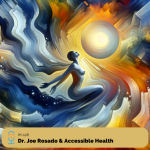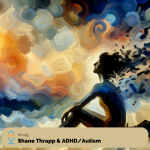
JJ Flizanes
Summary
In this conversation, JJ Flizanes, an empowerment strategist, shares her journey from personal training to exploring the intersections of physical, mental, emotional, and spiritual health. She discusses her development of the Core Wound Map, a tool designed to help individuals understand their emotional patterns and how they affect their lives. The conversation delves into the importance of structure in therapy, the role of emotional stability in healing, and the integration of scientific principles in understanding health and wellness. In this conversation, JJ Flizanes and Matt Hampton explore themes of hope, personal growth, and the creative process. JJ shares her excitement about writing a new book and the importance of healing through innovative programs and retreats. The discussion delves into the significance of creativity in health and well-being, the challenges of bridging knowledge gaps in health topics, and the impact of beliefs on physical health. They also touch on the fear of retirement and the necessity of finding purpose beyond work. In this conversation, JJ Flizanes discusses the importance of purpose and energy in life, the impact of core wounds on personal growth, and the methods for identifying and healing these wounds. The discussion also covers practical strategies for work-life balance, the significance of neuroplasticity in personal development, and the role of accountability in the healing process. JJ shares insights from her experiences and offers resources for listeners to explore further.
Takeaways
- JJ Flizanes is an empowerment strategist with a background in personal training.
- She developed the Core Wound Map to help individuals understand their emotional patterns.
- Astrology and personal beliefs play a role in how individuals perceive their lives.
- Therapy often lacks structure, which can hinder progress for many individuals.
- Emotional stability and feeling safe are crucial for healing.
- JJ emphasizes the importance of asking questions and seeking deeper understanding.
- She believes in blending different fields of knowledge for holistic healing.
- The body cannot heal if it is not in a positive emotional state.
- JJ has worked with cancer patients, highlighting the emotional aspects of disease.
- Radical remission studies show that emotional and mental health significantly impact physical health. Hope is essential for personal growth.
- Writing can be a transformative process.
- Healing is a journey that requires innovative approaches.
- Creativity is a vital aspect of health and well-being.
- Co-creation with the audience enhances content relevance.
- Beliefs significantly impact our physical health.
- Retirement can be daunting without a sense of purpose.
- Engaging with the audience helps identify their needs.
- Personal experiences shape our understanding of health.
- Curiosity and passion contribute to longevity. Purpose fuels energy and helps individuals thrive.
- Retirement is a concept that doesn’t resonate with those who love creating.
- Short vacations can be more beneficial than long ones.
- Core wounds can be identified and addressed through specific exercises.
- Understanding one’s core wounds can lead to significant personal change.
- Neuroplasticity allows the brain to adapt and grow through stress.
- Accountability in a group setting enhances the healing process.
- Proactive steps are essential for overcoming core wounds.
- Emotional responses to triggers can be managed with awareness.
- Healing requires commitment and effort from individuals.
Chapters
00:00 Introduction to JJ Flizanes
02:58 The Journey of an Empowerment Strategist
05:53 Exploring Astrology and Personal Beliefs
09:00 The Importance of Core Wound Patterns
11:52 Therapy: Structure vs. Traditional Approaches
14:59 Healing Through Emotional Stability
18:02 The Role of Science in Healing
21:06 Concluding Thoughts on Health and Healing
23:50 Embracing Hope and Future Aspirations
24:49 The Journey of Writing and Creating Content
26:44 The Importance of Personal Growth and Healing
28:22 Innovative Programs and Retreats for Healing
30:52 The Creative Process and Co-Creation with Audience
32:50 The Power of Creativity in Health and Well-being
35:01 Exploring Audience Needs and Personal Health
38:47 Bridging Knowledge Gaps in Health Topics
40:22 The Impact of Beliefs on Health and Existence
43:14 The Fear of Retirement and Finding Purpose
47:20 The Power of Purpose and Energy
48:15 Vacation Strategies and Work-Life Balance
51:24 Understanding Core Wounds and Their Impact
52:36 The Core Wound Exercise Explained
54:28 Identifying and Healing Core Wounds
57:11 The Circuit of Triggers and Reactions
01:00:24 Proactive Steps for Healing
01:01:18 Neuroplasticity and Personal Growth
01:03:34 The Importance of Accountability in Healing
01:07:32 Connecting with JJ Flizanes
Podcast: Play in new window | Download








